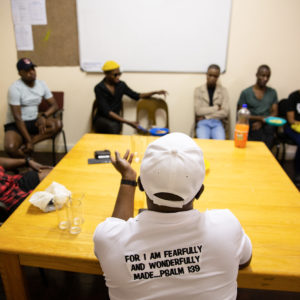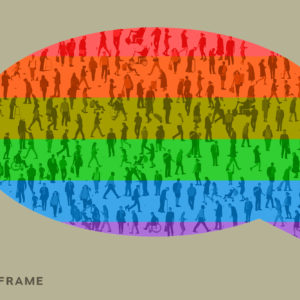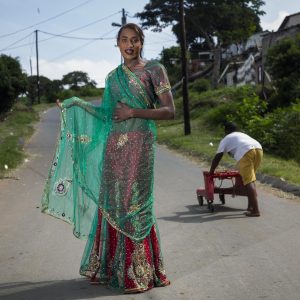DRC queer rights activist forced to go into hiding
The Congolese advocate for LGBTQIA+ rights has been living in fear after spurious charges of ‘promoting homosexuality’ led the police to her door.
Author:
16 May 2022

Crammed into a boat with more than 100 people, Cherie* prayed nobody would recognise her. “I wore a hat and a balaclava,” the transgender woman, 33, says of her attempts to remain under the radar. A few hours earlier, shortly before midnight, she had fled her home in the eastern Democratic Republic of Congo (DRC) after the police tried forcing her front door in the hope of arresting her.
After the six-hour boat ride to a neighbouring province, Cherie, a founding member and head of the non-profit queer rights organisation Rainbow Sunrise Mapambazuko, made her way to where she is now living in hiding. “It all started with threatening messages and insults from the youth in our neighbourhood,” she said. “I could not walk in the streets of our neighbourhood because the community did not want to see me. My presence bothered them.
“They accused me of inciting the youth of our neighbourhood to become homosexuals and that I promote homosexuality. They insulted me by saying, ‘You, pede [faggot], we will kill you. We will burn you alive. You bewitch our neighbourhood youth to become homosexual. You are a curse. You bring bad luck. We will burn your house.’”
Related article:
Difficult as the almost daily barrage of threats was, Cherie’s decision to flee her home came after facing the prospect of arrest. “This is when I called my lawyer, who went to the prosecutor’s office to find out the reason for the warrant,” she said. “My lawyer then asked me to leave that neighbourhood because the people there wanted me to be arrested and put in prison.”
According to the lawyer, who chose to remain anonymous, Cherie faces charges of criminal association, rape and pimping. “All these charges against Cherie were brought by young people and religious groups in her neighbourhood who consider her a public danger because of her work and her [sexual] orientation [and gender identity], which they consider contrary to Congolese morals,” he said. “They want to see Cherie in prison at all costs.”
He added that there is no evidence against Cherie, but “the offence of rape in the DRC is very sensitive. We have some cases where the perpetrators have been arrested and detained in prison for six months without any evidence.”
The lawyer said the case against Cherie will likely only be closed if “there is the financial means to pay for justice”. Failing this, she faces a maximum sentence of 10 to 15 years in prison “with fines that can reach $10 000” (about R160 000).
Queer and ‘criminal’
Cherie and other queer rights activists established Rainbow Sunrise Mapambazuko in 2010. “What prompted us to create our organisation was the context of violence against LGBTQI people in our region. We created our organisation to help people in difficulty and to promote our rights,” she said.
There are no provisions explicitly outlawing consensual same-sex sexual acts between adults in the DRC. But a 2021 report by the International Lesbian, Gay, Bisexual, Trans and Intersex Association (ILGA World) found that Article 176 of the country’s penal code, which criminalises activities that are considered an affront to “public decency”, had been used as the legal basis to criminalise LGBT persons.
The report noted that numerous attempts had been made over the past decade to criminalise consensual same-sex sexual activity. For example, a member of Parliament, Ejiba Yamapia, tried to gather support in 2010 for a bill on Sexual Practices Against Nature, which sanctioned same-sex sexual acts as “unnatural” and “immoral”.
Related article:
Another member of Parliament, Steve Mbikayi, proposed a similar bill in 2013. It sought to criminalise same-sex sexual activity as well as a ban on Pride events, advocacy meetings or any form of “promotion of homosexuality”. The bill prescribed a jail sentence of three to five years for gay people, and three to 12 years for transgender people. It was rejected, but Mbikayi presented similar legislation in 2015 and 2016.
The ILGA World report also found that those who had been arrested on suspicion of being gay or transgender faced numerous human rights violations, including harrasment, extortion, torture, being outed in the media and arbitrary, months-long detention.
Persistent persecution
Cherie’s case is not the first time the staff of Rainbow Sunrise Mapambazuko have been targeted. In December 2012, the police surrounded the organisation’s offices “in an apparent attempt to arrest the group’s leader”, the report noted. Although they did not succeed, Rainbow Sunrise Mapambazuko activists “would continue to be targeted”.
In May the following year, the then head of the organisation was arrested on charges of promoting homosexuality. While detained, he was tortured and denied food and water. He also said he had been “raped with sticks at least three times and beaten by inmates”. He was released after paying the authorities $400. After a failed attempt to assassinate him on his return home, he fled to neighbouring Uganda and, eventually, Europe.
Members of other organisations also face harassment. The executive director of the Movement for the Promotion of Respect and Equality of Rights and Health was reportedly threatened and harassed by the country’s police and National Intelligence Agency.
Anna Mmolai-Chlamers, the LGBTI, sex work and disability programmes manager of the Southern Africa Litigation Centre, said things are becoming tougher for queer people in the DRC. The centre partners with Rainbow Sunrise Mapambazuko.
Related article:
“While in other regions [in Africa] governments and the courts are protecting LGBTI people, in the DRC it seems to be really hard. So we are really worried about the situation for LGBTI [people] in the DRC.”
After more than two months of living in hiding, Cherie said all she hopes for is to secure the money to pay the lawyer and the authorities so that the case can be closed. Asked whether she feels safe where she is, Cherie said: “Not so much … I feel a bit relieved, but I am still afraid that these people might find me. The police from the public prosecutor’s office are [still] coming to my house to look for me. Days ago, they wanted to break the door to enter my house by force, thinking that I have been locking myself in the house all this time. When all this started, I really had the idea to commit suicide.”
Cherie vowed, however, that she will continue her work as an activist once her ordeal is over. “Activism is very important to me. I really care about my fellow human beings who are victims of rights violations every day. I have made it my goal to defend their rights, our rights.”
* Not her real name.



